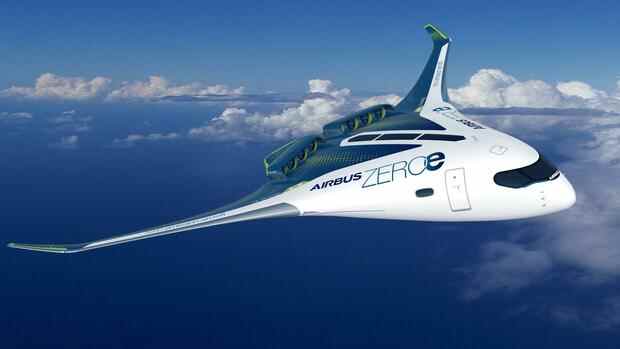The European aviation group wants to bring the first hydrogen aircraft onto the market by 2035.
(Photo: Airbus)
Frankfurt Airbus has launched a new partnership to allay doubts about its ambitious plan to launch a hydrogen-powered airliner by 2035. Together with the engine joint venture CFM, the European aviation group is developing a technology demonstrator that should be ready for use by the middle of the current decade. Airbus announced this at a virtual press conference in Washington.
CFM is a joint venture between the US company General Electric and the French airline Safran. CFM has already developed engines for short, medium and long-haul aircraft. Airbus and CFM now want to build on this experience.
“Today is a historic day for aviation,” Airbus Americas CEO Jeff Knittel said at the conference. “We have to test the technology, on the ground and in the air. To do this, we will develop a flying laboratory.”
The large-capacity jet A380 is to be used as a demonstrator. A fifth engine is to be installed in the rear of the aircraft – a conventional gas turbine engine, but which will be fed with hydrogen. Four hydrogen tanks are also installed in the rear part of the fuselage. In industry, gas turbines have been operated with hydrogen for some time. So the idea is not new, but it poses particular challenges on an airplane. For example, hydrogen burns much hotter than kerosene.
Top jobs of the day
Find the best jobs now and
be notified by email.
“We still have some challenges, but we don’t see any technological hurdles that we cannot overcome,” said Gaël Méheust, CEO of CFM.
For the tests, the jet is powered by its conventional four engines; extensive tests can be carried out on the fifth engine during the flight. Airbus Chief Technical Officer Sabine Klauke said: “We will be able to collect a lot of data. The pilots have displays on which they can see the key figures of the test engine.”
>> Read about this: After a record profit: How Airbus wants to reinvent itself
Even if the company does not only want to rely on this drive: For Airbus boss Guillaume Faury, hydrogen is one of the central technologies on the way to climate-neutral air traffic. Archrival Boeing, on the other hand, is holding back on the subject and is relying on synthetic kerosene for the planned climate neutrality of air traffic by 2050.
Just a few days ago, Reiner Winkler, CEO of engine and maintenance specialist MTU Aero Engines, warned that it would still be a long time before aircraft with completely new engine technologies were on the market on a significant scale.
Critics see enormous challenges for hydrogen propulsion in aviation. Hydrogen will still be scarce in the long term, and there is also a lack of infrastructure at the airports to supply the jets. The energy density is also not sufficient for long-haul flights. But they are precisely responsible for the majority of the 2.8 percent of global emissions that come from air traffic alone.
When developing hydrogen aircraft, Airbus also wants to draw on its own experience in space travel. ArianeGroup is a joint venture with Safran, who also hold shares in CFM.
(Photo: imago images / Lars Berg)
Airbus is also initially thinking of a regional aircraft with 50 to a maximum of 100 seats when it comes to its hydrogen aircraft. On long-haul routes, synthetic fuels will remain the method of choice for Airbus boss Faury for a long time.
Nevertheless, Airbus continues to develop hydrogen technology, which is heavily promoted by many governments in Europe, including Germany.
Airbus increases the pressure on suppliers
Airbus boss Faury recently increased the pressure on suppliers when it came to new drive technologies. He no longer fundamentally ruled out that Airbus itself could get involved in the development of new aircraft engines. That would weaken the previous division of labor in the industry, which caused heated discussions among suppliers.
A few days ago, Faury tried to calm things down. “I did not say that we would change our strategy,” he said when presenting the business figures for 2021. He also did not say that Airbus wanted to become a manufacturer of aircraft engines. He was only asked whether the company was fundamentally capable of doing so. He said yes.
In addition, the Airbus management has been reorganizing the network of group-owned suppliers for weeks. This should reduce complexity and make the company more flexible. The aircraft market is changing permanently with the new propulsion technologies, and Airbus wants to be able to react to this.
Representatives of the company and the IG Metall trade union recently agreed to found a new company in Germany on July 1, in which the component construction previously scattered throughout the company will be bundled. For the production of the upstream individual parts of the supplier subsidiary Premium Aerotec with locations in Augsburg, Varel and Romania, Airbus wants to examine a takeover offer from the German family company Muhr und Bender (Mubea) together with the employee representatives. Faury said at the balance sheet presentation that this process is still ongoing.
More: Risky bet on hydrogen – how Airbus wants to make its aircraft climate-friendly
